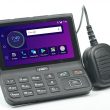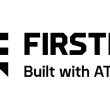Siyata Mobile, Softil team to develop MCX-compliant rugged LTE handset
Siyata Mobile is developing a ruggedized LTE handset that will leverage Softil’s BEEHD technology to deliver mission-critical-push-to-talk (MCPTT) and other mission-critical communications (MCX) that is expected to be commercially available during the second half of this year, the Canada-based device maker announced yesterday.
In the United States, Siyata Mobile is best known for its Uniden UV350 in-vehicle LTE device—known for its voice clarity and volume, even in noisy environment—that is a designated FirstNet Ready product. Siyata Mobile last year launched the UR5 rugged LTE handset that is sold internationally, but this new MCX-compliant product will be the company’s first handset sold in North America, according to Glenn Kennedy, Siyata Mobile’s vice president of sales.
“It’s a new product that we’re developing, and we’re using [Softil’s MCX] SDK [software development kit] to get the product to market more quickly, rather than starting from scratch, so to speak,” Kennedy said during an interview with IWCE’s Urgent Communications.
“We’ re still working with all of the wireless carriers on our existing products. We’re hopeful that new products like this one will get us to perhaps launch some new carriers around the world and in North America. We’ll see how that goes, but that’s definitely the hope.”
Siyata Mobile is not yet disclosing details about the new rugged handset’s branding, pricing or any new functional capabilities it will provide. However, Kennedy said the initial feedback from wireless carriers about the new device “has been positive” and shared some of the general characteristics users can expect.
“Loud and clear audio, long battery life and dedicated PTT buttons—all of the kinds of things that customers are going to be looking for, we’ll make sure that our device supports those,” he said.
Siyata Mobile officials expect the new rugged LTE handset will be launched during the second half of this year, and Kennedy said he believes attendees of the IWCE 2021 event in late September will be able to see the new device.
“We definitely expect to be at that show, and we expect to have our device on display at that time,” Kennedy said. “Hopefully, it will be already launched, but we will see—you never know.”
Softil’s BEEHD MCPTX supports 3GPP standards for Release 16 MCX—MCPTT, MCVideo and MCData—and the Israel-based firm is working toward a version that will comply with Release 17, according to Sagi Subocki, Softil’s vice president for products and marketing.
“We don’t compete with our customers—we don’t have an end product,” Subocki said during an interview with IWCE’s Urgent Communications. “We provide enabling technologies for the vendors, and that’s what Siyata is basically doing here. Siyata is taking our SDK [software-development kit] and will integrate it into their next-generation device and will enjoy all of the MCX compliancy that we’re providing.”
Softil is not able to disclose all uses of its MCX software platform, but key public announcements include projects in South Korea and in the United Kingdom, where Softil’s solution is being used by Capita to help dispatchers in control room communicate via MCX technologies, Subocki said.
“This is not theory,” Subocki said. “We have been running like this in Korea and other places for a long time already.”
Ken Rehbehn, Omdia’s senior principal analyst for public safety and critical communications, said the joint efforts of Siyata Mobile and Softil are promising for the developing market of MCX solutions.
“This is an important announcement, because there have been relatively few options for terminal equipment with MCPTT,” Rehbehn said during an interview with IWCE’s Urgent Communications. “The announcement shows that, directionally, Siyata is moving to support MCPTT. What’s also important is the vision of bringing further terminals to market. We don’t know what these [Siyata] terminals will be, but this points to a growing variety of MCPTT-compliant terminals that will have a stimulative impact on the vendors competing in the marketplace.
“This is very good news for Verizon, which launched an MCPTT server capability based on the Ericsson platform. It assures an expanding range of terminal equipment and—as a result—applications that can come on to their service.”
Softil CEO Pierre Hagendorf provided his assessment of the company’s role in the development of MCX solutions for first responders.
“We believe that Softil’s BEEHD technology is where the MCX revolution starts and is accelerating the roll out of new mission-critical communications networks and devices across the globe, enabling first responders in blue-light agencies to connect and work smarter,” Hagendorf said in a prepared statement. “We believe that this new development with Siyata Mobile will provide agencies with a new, world-class MCX device.”
Siyata CEO Marc Seelenfruend echoed this sentiment.
“As the MCPTT revolution takes hold across the globe, Siyata aims to better serve public agencies and private enterprises with our first innovative, mission critical push to talk device,” Seelenfruend said in a prepared statement. “This device will be built from the ground up using Softil’s BEEHD software development kit allowing Siyata to be MCPTT enabled for leading cellular carriers both in North America and globally.”

















